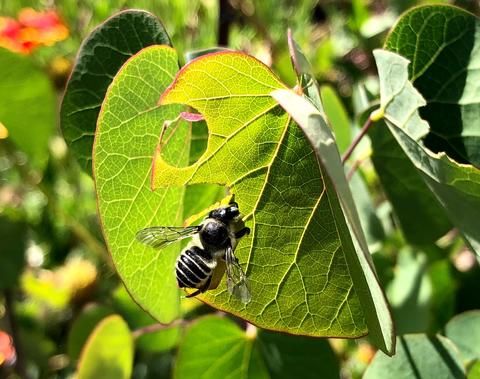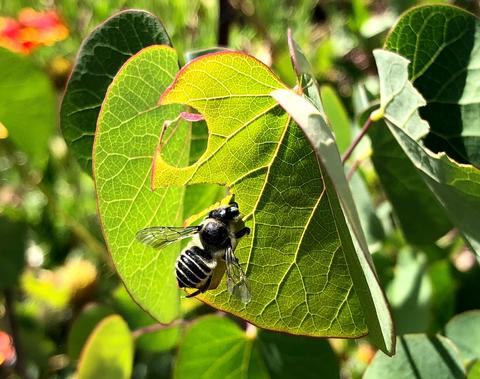
Neonicotinoid insecticides in any amount are harmful to bees
A new UC Riverside study shows that neonicotinoid insecticides made for commercial plant nurseries are harmful to a typical bee, even when applied well below the label rate

ByJules Bernstein*, UC Riverside
Chemically similar to nicotine, neonicotinoids are insecticides that protect against insects that consume plants, like aphids, but seriously harm the beneficial insects, as bees. They are widely used by commercial producers..
Much research has focused on its use in food crops such as rapeseed, in which they are normally applied in low doses. However, this study is one of the few to examine the application of neonicotinoids in potted ornamental plants., which may represent more potent and acute sources of toxin exposure forbees.
"Nenicotinoids are often used in food crops as a seed treatment", explained the UCR entomologist and lead author of the study, Jacob Cecala. "But they are generally applied in larger quantities to ornamental plants for aesthetic reasons. The effects are deadly, no matter how much the plants are watered. "
Cecala said he was surprised with the result, since neonicotinoids are water soluble. going to study, he assumed that more water would dilute the amount of damage they did to the bees.. The researchers were also curious to see if increased irrigation could benefit the bees., despite exposure to the insecticide, increasing the quantity or quality of nectar offered by plants.
To test these assumptions, researchers raised bees on native plants in potted flowers that received too much or too little water.. The plants were selected based on their popularity in nurseries., drought tolerance to ensure flowering even without a lot of water and its attractiveness to bees. Besides, half of the plants were treated with the insecticide.
Although increasing water decreases the pesticide's potency in flower nectar, the negative effects on bees were still observed.
"Unfortunately, we observed a decrease in 90% in the reproduction of bees with high and low levels of irrigation", these Cecala.
This study is also one of the few to examine the effects of neonicotinoids via ornamental plants on solitary bees., which constitute more than 90% of native bee species in North America, and an even higher percentage in California.
Lone bees are not the bees that left the hive and are now alone. It's a kind of bee that lives alone, does not produce honey, it doesn't have a queen nor does it live in a hive. Because they don't have a honey reserve to protect, they are not aggressive either.
"Lone bees are more representative of the ecosystem here and are potentially more vulnerable to pesticides", said entomologist and study co-author Erin Rankin.
If a social worker bee – such as a honey bee – is exposed to the insecticide and dies, this will not necessarily affect the longevity of the hive.. However, if a lone bee dies, your lineage is interrupted.
In this study, researchers used alfalfa cutter bees, that nest in tunnels and lay eggs one at a time. They are very similar to California's native solitary bees and are part of a genus that can be found all over the world..
The first time Cecala and Rankin did this experiment, they used the insecticide concentration recommended on the product label.. All bees died in a matter of days.
The next time they performed the experiment, used a third of the recommended dose and still found negative effects on reproduction., in the ability of bees to feed and in general physical conditioning. "He almost annihilated them completely", these Cecala.
Although this study used a neonicotinoid product formulated for nurseries, similar product formulations for home gardeners also tend to be highly concentrated..
Plants in nurseries or residential backyards represent a smaller total area than food crops such as corn or soybeans.. However, high potency neonicotinoid products can have a great effect, even in small areas. In 2013, neonicotinoids applied to flowering trees in an Oregon retail parking lot caused massive bee death , over 25.000 dead.
The researchers recommend that nurseries quantify the amount of pesticides that enter flowers due to irrigation and pesticide regimes., and consider alternative management practices that reduce damage to bees and the ecosystems that depend on them.
“It's not as simple as 'don't use pesticides' – sometimes they're necessary”, these Cecala. "However, people can look for a different class of insecticide, try to apply them to plants that are not attractive to bees or find biological methods of pest control.”
Reference:
Pollinators and plant nurseries: how irrigation and pesticide treatment of native ornamental plants impact solitary bees
SOURCE: https://www.ecodebate.com.br/2021/08/02/inseticidas-neonicotinoides-em-qualquer-quantidade-sao-prejudiciais-para-as-abelhas/
Jacob M. Cecala and Erin E. Wilson Rankin
DOI: https://doi.org/10.1098/rspb.2021.1287
Published by:Royal Society
Print ISSN:0962-8452
Online ISSN:1471-2954

Sorry, the comment form is closed at this time.